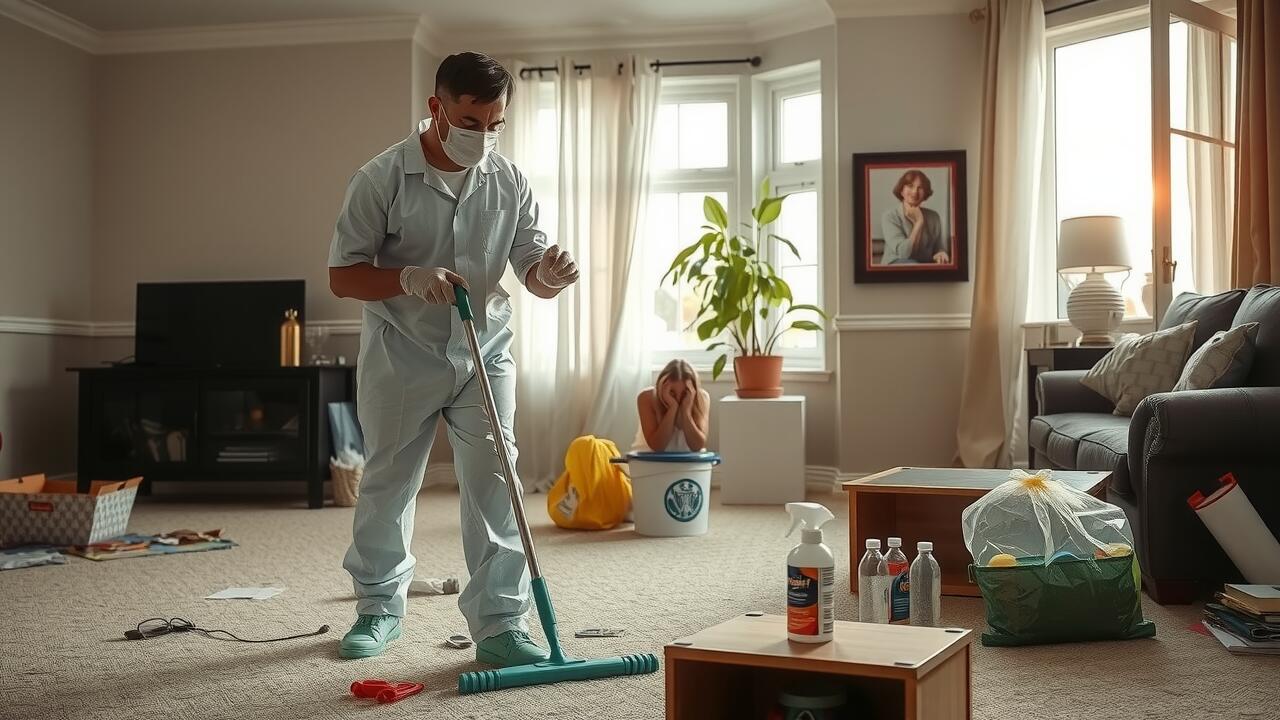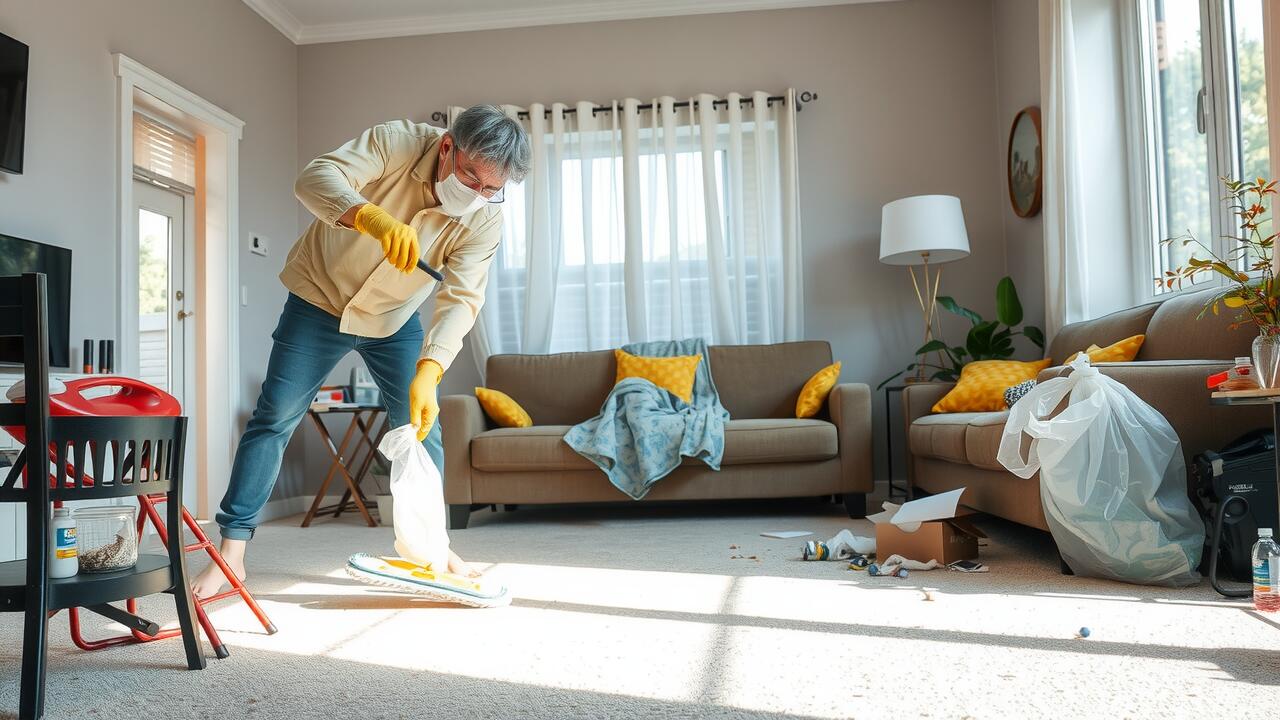
Tools and Equipment Used in Cleanup
Crime scene cleanup requires a range of specialized tools and equipment to ensure the area is properly sanitized and safe for re-entry. Personal protective equipment (PPE) is crucial, including gloves, masks, and suits that protect technicians from biohazards. Additionally, high-powered vacuums and steam cleaners help remove contaminants effectively. Disinfectants and enzymatic cleaners are vital for decontaminating surfaces, while absorbent materials aid in handling spills and bodily fluids. Various types of containers and bags are necessary for the safe disposal of hazardous waste.
In cities like Columbus, Ohio, trauma cleanup professionals rely on these essential tools to handle potentially dangerous situations. The cleanup process often requires the use of specialized equipment such as crime scene kits, UV lights for identifying bodily fluids, and air scrubbers to improve indoor air quality. Technicians must be well-trained in using this equipment not only for effectiveness but also for their own safety. A thorough understanding of the gear used in trauma-related situations ensures that the job is done with high standards of care and compliance.
Essential Gear for Crime Scene Technicians
Crime scene technicians require specialized gear to handle the unique challenges of their work effectively. Protective clothing is essential, including full-body suits, gloves, and masks to prevent exposure to hazardous materials and biohazards. Face shields and goggles should also be part of their kit to protect against splashes and contaminants. In addition to personal protective equipment, technicians often use sturdy footwear to navigate potentially unsafe areas safely.
Cleaning supplies play a crucial role in their operations. Disinfectants and specialty cleaning agents help eliminate pathogens and ensure proper sanitation. Technicians often carry tools such as scrapers, brushes, and vacuums designed for biohazard cleanup. For those engaged in trauma cleanup in Columbus, Ohio, having reliable gear can make a significant difference in efficiency and safety during sensitive situations.
Safety Protocols for Crime Scene Cleaners
Safety protocols are essential for crime scene cleaners due to the hazardous nature of their work. Adhering to strict guidelines ensures the safety of both the technicians and the environment. Personal protective equipment (PPE) is a crucial component of these protocols. Cleaners typically wear gloves, masks, face shields, and protective clothing to minimize exposure to harmful substances. Proper training is also vital, as it prepares workers to handle potentially infectious materials safely.
In locations such as Columbus, Ohio, trauma cleanup requires specific certifications to comply with local regulations. Cleaners are trained to recognize biohazardous materials and follow proper disposal methods. Regular training sessions keep technicians updated on best practices and emerging risks in the industry. Staying informed about local laws also ensures that cleanup operations adhere to legal requirements and environmental standards.
Health Risks and Protective Measures
Crime scene cleanup involves exposure to various health risks, including biological hazards such as bloodborne pathogens and hazardous materials that may be present at a scene. Technicians can encounter bacteria, viruses, and other dangerous substances that pose significant health threats without proper precautions. Consistent training and adherence to safety protocols are essential to mitigate these risks effectively. Technicians must understand the nature of the materials they are working with, ensuring they remain vigilant and prepared for any contaminants.
Protective measures are critical in the field of trauma cleanup. Wearing personal protective equipment (PPE) is a fundamental requirement; this includes gloves, masks, gowns, and sometimes respirators to shield against harmful agents. In regions like Columbus, Ohio, where crime scene cleanup is a vital service, professionals must remain compliant with state and local regulations to maintain safety standards. Ensuring that these protocols are followed not only protects the technicians but also upholds the integrity of the cleanup process.
Setting Up Your Own Cleaning Business
Starting a crime scene cleanup business requires careful planning and an understanding of the unique demands of this industry. You will need to conduct thorough market research to identify potential clients and competitors in your area. Establishing a strong online presence is key, as many customers will turn to the internet to find services such as Trauma Cleanup in Columbus, Ohio. Building a professional website and utilizing social media can help in outreach and visibility.
Choosing the right legal structure for your business is essential. You might consider forming an LLC or corporation to protect your personal assets. Obtaining the necessary licenses and permits is also crucial, as regulations can vary by state. Once you have established the legal foundation, investing in essential equipment and supplies will enable you to handle the demands of cleanup effectively. Networking with local law enforcement and emergency services may help you secure contracts that provide a steady stream of work.
Steps to Establishing a Crime Scene Cleanup Company
Starting a crime scene cleanup business requires careful planning and adherence to regulations. First, research the legal requirements and necessary permits for operating in your area. This process may involve contacting local health and safety departments to ensure compliance with state laws. Building a solid business plan is crucial, detailing your services, target market, and pricing structure. Establishing a branding strategy can help differentiate your business from competitors, especially in niche markets like Trauma Cleanup in Columbus, Ohio.
Next, invest in the proper equipment and training for your team. This includes personal protective gear, specialized cleaning supplies, and tools specifically designed for hazardous material removal. Training staff in decontamination processes and safety protocols is essential for maintaining high standards and ensuring client safety. Networking with local law enforcement, hospitals, and funeral homes can create referral opportunities, helping to establish a client base.
FAQS
What qualifications do I need to become a crime scene cleaner?
While formal qualifications are not always required, having a high school diploma or equivalent is beneficial. Many employers prefer candidates with certifications in biohazard cleanup or hazardous materials handling.
Is there a certification process for crime scene cleanup?
Yes, there are certification programs available through various organizations that specialize in biohazard and crime scene cleanup. Completing these programs can enhance your credibility and knowledge in the field.
What kind of training is necessary for crime scene cleanup?
Training typically includes learning about safety protocols, handling hazardous materials, and understanding the psychological aspects of working in crime scenes. Many companies offer on-the-job training as well.
Are there health risks associated with crime scene cleanup?
Yes, crime scene cleanup can expose workers to various health risks, including infectious diseases and hazardous materials. It is crucial to follow safety protocols and use proper protective gear to minimize these risks.
How do I start my own crime scene cleanup business?
To start your own business, you will need to conduct market research, create a business plan, obtain necessary licenses and insurance, and invest in the proper equipment and training to ensure compliance with safety regulations.
